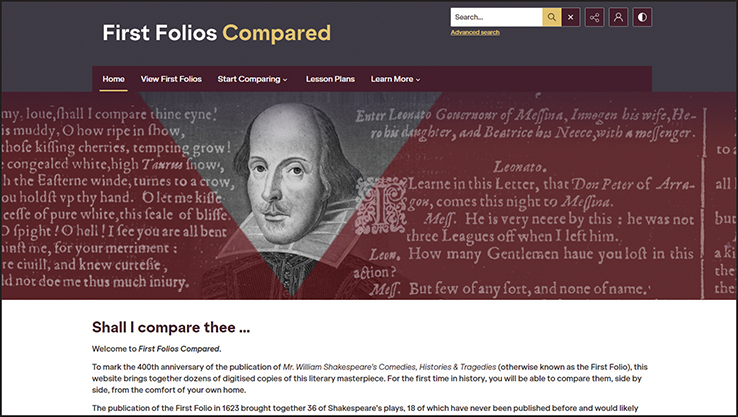First Folios Compared | eReview

CONTENT The First Folio Compared project offers unprecedented access to various versions of Mr. William Shakespeare’s Comedies, Histories & Tragedies (commonly referred to as the First Folio), which was the first collected edition of Shakespeare’s plays, published in 1623. This open-access site, created and hosted by AM, was launched in 2023 in celebration of the 400th anniversary of the publication of the First Folio.
It is believed that 750 First Folios were printed, while 233 are known to have survived; nearly 60 from 30 locations are currently available on the First Folio Compared site, with new folios being added continually. The First Folio contains 36 plays, half of which had not been previously printed. Many of these classic plays, such as Macbeth, Twelfth Night, and The Tempest, might not have survived had they not been included in this influential work. Because of the value of these texts, most are not publicly available, and many were digitized specifically for this project. Contributing partners are libraries, universities, museums, and research institutions across the globe, including the Folger Shakespeare Library, the University of Toronto, the University and City Library of Cologne, and Boston Public Library.
Although readers might expect the First Folios to be identical, this site demonstrates that each work is unique. Some are in excellent condition, while others show considerable wear and tear. Researchers will discover tears, marks, stains, and notes made by readers who were lost to history. Some copies are missing pages, and others show different marks and changes made by individual printers who created the work.
USABILITY AM’s engaging site allows researchers to access the folios by browsing all of the documents available on the site or browsing by institution. Users can also access metadata information for folios hosted on other sites. A range of facets allow users to quickly refine searches. These facets include institution, Shakespeare access number, record status, complete/missing pages, annotated/unannotated, associated name, and owner. Clicking a folio image brings up a summary and bibliographic details and allows users to access all of the folio’s pages. An array of tools (zoom in, zoom out, rotate, full-screen) are available at the top of the frame.
A central focus of the First Folios Compared project is to facilitate comparisons and encourage nuanced explorations of textual differences. To this end, Shakespearean scholar and Oxford professor Emma Smith provides outstanding information on features that users might investigate, including stop-press marks, print-shop marks, marks of use, damage, and more. A comparison page enables direct, side-by-side comparisons of two versions of the text. The more complex International Image Interoperability Framework Mirador viewer tool makes it possible to compare more than two versions simultaneously. Although this tool is powerful, first-time users will want to review the instructions before proceeding, as they’ll need to learn how to cut and paste URLs from the target documents into the viewer.
PRICING The First Folios Compared project is a freely available online resource.
VERDICT This superbly executed open-access database offers an unprecedented gateway to different versions of Shakespeare’s First Folios. AM’s powerful search tools and thoughtfully selected tips and pointers allow for exciting research opportunities.
RELATED
ALREADY A SUBSCRIBER? LOG IN
We are currently offering this content for free. Sign up now to activate your personal profile, where you can save articles for future viewing









Add Comment :-
Comment Policy:
Comment should not be empty !!!